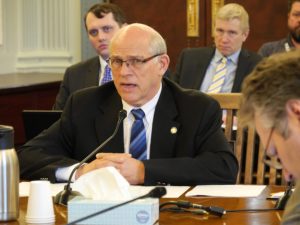
The survivors of state employed police and firefighters who die in the line of duty would receive health insurance under a bill the Senate passed Wednesday.
The Senate amended House Bill 23 so that it no longer requires municipalities to cover their workers’s survivors. Instead, municipalities will be able to opt in if they choose.
North Pole Republican Sen. John Coghill said the bill combined different ideas after more than two years of debate.
“It would be so wrong for us to fail those communities and family members because we can’t agree on a couple of issues,” Coghill said. “This is the best we can do, given the timeframe we have and all the conditions we have to work with.”
Both former Gov. Sean Parnell and Gov. Bill Walker have provided benefits to survivors of state troopers who’ve died in the line of duty. But these survivors have lobbied over the last two sessions for a law to make the benefits permanent.
The bill would cover surviving spouses for 10 years, most dependent children until age 26, and dependents with permanent disabilities for life.
Anchorage Democratic Sen.Bill Wielechowski proposed an amendment that would have required municipalities to participate. The state would cover half the costs of municipalities with fewer than 10,000 residents. Larger boroughs and cities would have been required to pay the full cost.
Wielechowski said no one should be left out of the system.
“If you were to ask the people of Alaska should be something that is required, I think it would overwhelmingly be yes,” he said.
Wielechowski’s proposal was defeated by a 13-6 vote, with Wasilla Republican Mike Dunleavy joining the five minority-caucus Democrats in voting for the amendment.
Coghill said it may be appropriate to require municipalities in the future, once there’s a system in place. He noted the bill would allow both private donors and the state to provide money to lower the cost for municipalities that choose to opt in.
“Maybe there should be a requirement put on it. I don’t disagree entirely,” Coghill said. “I just don’t know that when you first formulate it, and you put it out like a suit of clothes and you must fit it, if it’s going to work for every community. So I think there has to be time for that.”
All 19 senators present voted for the bill. It goes back to the House, which must decide whether to agree to the Senate’s changes.
The survivors of state employed police and firefighters who die in the line of duty would receive health insurance under a bill the Senate passed today.
The Senate amended House Bill 23 so that it no longer requires municipalities to cover their workers’s survivors. Instead, municipalities will be able to opt in if they choose.
North Pole Republican Senator John Coghill says the bill combined different ideas from more than two years of debate. “It would be so wrong for us to fail those communities because we can’t agree on a couple of issues. This is the best we can do, given the timeframe we have and all the conditions we have to work with.”
Both former Governor Sean Parnell and Governor Bill Walker have provided benefits to survivors of state troopers who’ve died in the line of duty. But these survivors have lobbied over the last two sessions for a law to make the benefits permanent.
The bill would cover surviving spouses for 10 years, most dependent children until age 26, and dependents with permanent disabilities for life.
Anchorage Democratic Senator Bill Wielechowski proposed an amendment that would have required municipalities to participate. The state would cover half the costs of municipalities with fewer than ten thousand residents. Larger boroughs and cities would have been required to pay the full cost.
Wielechowski says no one should be left out of the system. “If you were to ask the people of Alaska should be something that is required, I think it would overwhelmingly be yes.”
Wielechowski’s proposal was defeated by a 13 to 6 vote, with Wasilla Republican Mike Dunleavy joining the five minority-caucus Democrats in voting for the amendment.
Coghill says it may be appropriate to require municipalities in the future, once there’s a system in place. He notes the bill would allow both private donors and the state to provide money to lower the cost for municipalities that choose to opt in.
Coghill stated, “Maybe there should be a requirement put on it. I don’t disagree entirely. I just don’t know that when you first formulate it, and you put it out like a suit of clothes and you must fit it, if it’s going to work for every community. So I think there has to be time for that.”
All 19 senators present voted for the bill. It goes back to the House, which must decide whether to agree to the Senate’s changes.
Andrew Kitchenman is the state government and politics reporter for Alaska Public Media and KTOO in Juneau. Reach him at akitchenman@alaskapublic.org.




